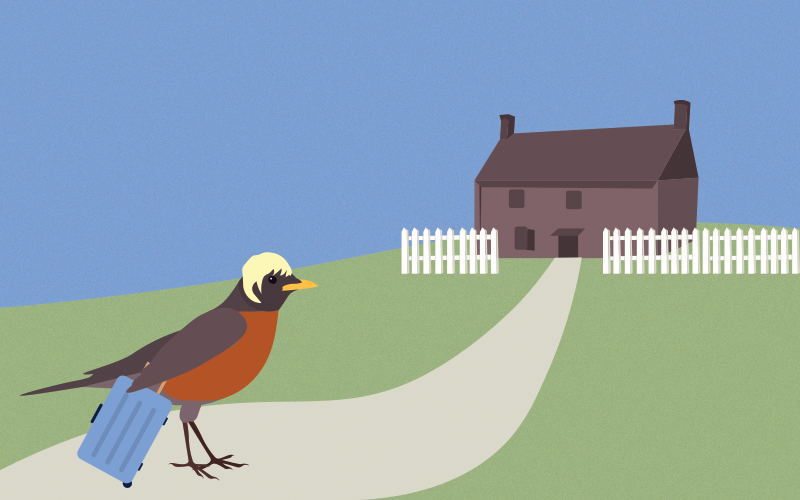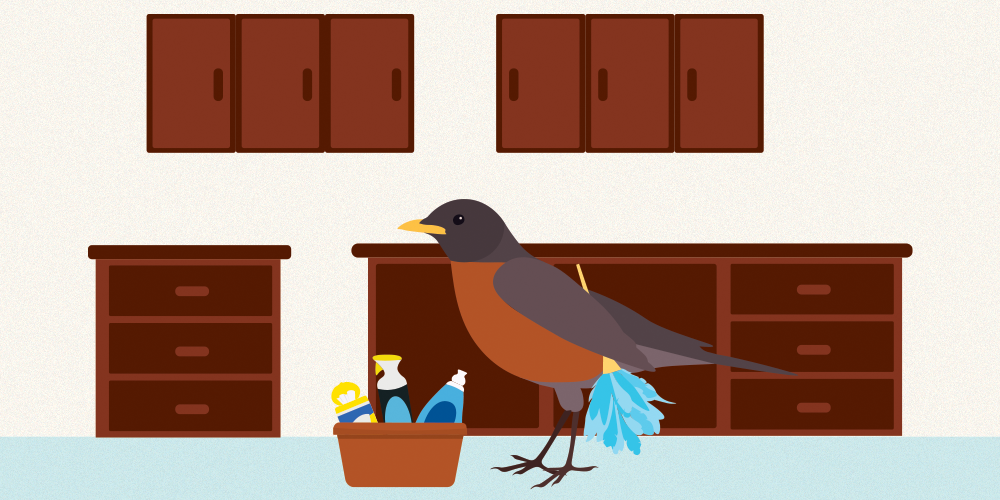I’ve never known someone who is aware of the BBC’s 1970 production of Robin Redbreast, though I fastidiously share this black and white drama whenever I can with whomever I think might be interested, or whom I might interest.
The 75-minute program was part of a series called Play for Today, with each episode being shot in color on videotape, and surviving only in 16 mm in the aforesaid b & w. The BBC served up a lot of horror television goodies starting with 1968’s Whistle and I’ll Come to You, an adaptation of what many fright buffs regard as M.R. James’s finest ghost story.
The James film birthed the A Ghost Story for a Christmas series that ran through the 1970s, but there were other mini-masterpieces of the spectral and doomed, such as 1972’s The Stone Tape, about a kind of haunted operating system, and 1977’s Children of the Stones, which gave new meaning to the expression, “between a rock and a hard place,” if by the latter we mean, “zone in which one is eternally screwed.”
Directed by James MacTaggart from a script by John Griffith Bowen, Robin Redbreast tells the story of Norah Palmer, played by Anna Cropper. It’s a tale of rebirth and vernality, via the portentous power of the spring, and how that builds into the wild, blooming life of summer, when colors and experiences can seem to overrun the human condition. A human condition that, in this diegesis, is born again out of sacrifice and death.
Norah has recently been left by her boyfriend, a man to whom she had not fully committed, but stayed with because of a perceived lack of options. And now, terming and bemoaning herself middle-aged — though she’s all of 35 —she’s not sure what to do with their country cottage tucked away from the bustle of London.
Pastoral horror is a distinctly English, Irish, and Scottish phenomenon. There’s a transposition at work, where those hauntings we usually associate with ancient castles and aged horrors take a kind of field trip, and steep into the earth, accrete into trees, are gathered up in the brush alongside what ought to be the peaceful rill. Attempts to commune with nature acquire the quality of a house invasion, only away from home, in this roofless, unprotected burg.
Robin Redbreast is a surprisingly frank and modern picture as we consider it over 50 years later, and I suspect the film had especial shock value at the time. Norah commiserates with her two married friends, Jake (Julian Holloway) and Madge (Amanda Walker) in their London flat, and freely articulates her concerns and fears. She despairs that she let so much of her life drain away in a relationship that never inspired her conviction, for starters. Certainly a resonant note for many of us in a world where it seems to become harder and harder to forge meaningful connections. Plus, she’s horny. She’ll miss the sex, and she has her needs.
You even get the impression that these three friends — and Madge is that brand of passive-aggressive friend that you just accept is going to rip on you the moment you leave the room — have dabbled in what we shall call some “group work” together. Norah comes across as solid, practical, strong, disappointed but not weak, a person who bounces back in this life and will now set about doing so. She possesses the cottage, and she will go there, make of it an additional home in which to regather her focus and do something admirable — work on herself.
Ghost stories take myriad forms, and because of its religious associations, we often overlook one of the finest spring ghost stories, that being the Christ tale of Easter, which is itself a sort of pastoral horror, albeit without the grim or tragic ending. A guy has had his flesh nailed into a cross, is hung up in the air until dead, then stashed in a cave, where he comes back to life, emerging again to spread the word of his reanimation, challenging doubters to probe his nail wounds. “Finger these gory holes in my body,” in essence.
M.R. James himself was a master of atmosphere, but he also understood the power of tactility — that spirit or being from the beyond with the corporeal presence and the touchable body or form. Little from the pages of the whole of horror appears to reach out and touch us like hair in a James tale. That notion of tactility extends to Robin Redbreast. Its sexual aspect is not flashy, but its thrust, if you will, is to underscore our need for contact and belonging, a fusing with one’s fellow human on the inclusionary level. Having one life, losing it, and aiming to procure a better one, is a work of a certain brand of heroism. The same went in 1970, which is a powerful reminder of taking necessary plunges in 2021.
Norah takes her leave of London, and to the windswept cottage she goes, where she meets a coterie of villagers who will not really be up to what they purport to be up to. There’s her nosy, officious housekeeper Mrs. Vigo (Freda Bamford), and Mr. Fisher (Bernard Hepton), who is unlike any character I’ve encountered in any province of terror art.

He’s a historian, and an autodidact, who seemingly knows everything about everything, speaks in a passionless, measured flow of learned words. His short-brimmed Stetson hat is downright unsettling in that he’s a sort of elemental force and figure, topped off with this touch of the human. The action takes places almost entirely inside the cottage, with some sequences upon the immediate grounds, but that cottage is as claustrophobic as a cave, and we have this weird sensation that even while indoors, we’re outside, vulnerable to a world with a reckoning power which we can scarcely conceive, let alone combat.
Watching it, you’ll notice that the wind virtually never stops. It’s the soundtrack, the ultimate in a diegetic, au natural, scoring. I wonder if David Lynch saw Robin Redbreast sometime before he made Eraserhead, which features its own windy, aural assault, air currents as a type of audible, sucking chest wound.
Algernon Blackwood’s 1907 story, “The Willows,” is the prose precursor and analog, a narrative of two men boating down the Danube, with an unceasing noise emanating from the titular vegetation. Sound is the substrate to which the horror is affixed, a constant of mood that becomes this absolute and a truism — a given — such that we accept it without conscious protest. The redoubtable, uncanny, unnatural ecosystem whose consistency causes us not to call it out.
We’re almost complicit in what is: if not a perversion of nature, an inversion of how nature ought to be on a regular basis. It’s this subtle distinction that is the shot that tells — because something might be okay, but then again, there is the subconscious tug that it is not. That’s a tug that we know well in our lives now where we’re so often performative, taking comfort in our social media “likes,” and using them as some barometer of how we’re regarded, though really we are frightened that we’re alone in the ways that actually matter.
The film’s one moment of humor is unintentional: in a rare sequence away from the cottage, Norah comes upon Rob — our Mr. Redbreast, after a fashion — cartoonishly beating the snot out of a tree in the woods with his karate moves. He’s a step up from the village idiot locals hire to muck out their gutters, a young buck with the ripping body, and absolutely no social skills. Rob all but comes with the label of “short term fling guy,” someone who could be viewed as a stud in all but actual purpose, but we’re going to want to hold that thought, because, for the sake of this film, Rob is a breeder, though he doesn’t know it. Having read that women fancy an expert in something or other — doesn’t matter what — he’d decided to become one on the uniforms of the SS, which is the stuff of his dinner conversation. The vibe of the film is sufficiently creepy, though, that even this hideousness merely registers as a social faux pas, rather than, “Damn, this guy is going on about people who cooked other human beings in ovens.”
The talismans of Robin Redbreast are found objects that are strategically situated, though the exact reasoning is never delineated. There is, for instance, half a marble, which ends up being toted around, never far from Norah’s person, like when she returns to London for confabs with Madge and Jake, or the abortionist, after getting pregnant with Rob’s baby. Their tryst was facilitated by devilishly loud noises outside the cottage after Rob had taken his leave following a disastrous first date. Turns out Nazi talk doesn’t exactly get the ladies hot. He returns in the role of protector — though he’s scared shitless himself — and away the two ill-matched lovers repair to bed, but with Norah’s diaphragm gone suspiciously missing, only to return the next day, after the coitus and after the fact.
As the narrative moves along, with Norah having second thoughts about terminating her pregnancy, Mr. Fisher keeps turning up inside of the cottage. He’s never asked in. We simply see him in mid-conversation, which for him is mid-mansplain, really. His stealthy manner of ingress becomes oddly terrifying. He’s insidiousness incarnate, but you also like to hear him talk; the man is a knowledge fount. A decision is reached: this baby will be had, but the villagers — even though we have the sense there are about five of them — are not letting Norah leave their locale. Her car breaks down, the phone stops working, and an attempt to catch a ride on the bus is thwarted when the coach pulls up instead at a random spot and then drives off as Norah races towards it. Our Rob has big plans — once he scrapes together the funds, he’ll be starting a new life of his own in Canada.
The key date around which this unofficial abduction is oriented is Easter. The maid Mrs. Vigo had badgered Norah into attending a church service, and though it might have been for BBC budgetary reasons that we don’t see a preacher or parishioners and said service takes place via a succession of images that look like they’ve been filched from a creepy church-sanctioned coloring book, the effect is deeply discomfiting. A hybridization of sanctified ritual and folk collage art. Everything feels shaded to the atonal in Robin Redbreast. We’re moving forward with pace. The film walks a direct line, but through a scrim of fog at times. There is the sound from outside the Haaz, and Norah, and we, the viewers, would like to think we know the source, but the source is never what it seems.
Rob makes another return to the cottage on an evening when the abode is like a ship at sea. We have the feeling that the land outside is buckling like so many waves. Rob has entered for protection, but Norah thinks he’s in on this accursed attempt to stop her from leaving prior to Easter, now that she’s heavy with child. She’s armed with a knife, but she realizes that Rob is even more scared than she is. Turns out, he’s the one with the larger problem, and the Karate stud will not be making it to Canada after all. His blood has other business: to enrich the earth, the cycle of life, the way of these people who are not people.
A lot of this plays out offstage, which also means we’re left to imagine, as Norah is as well when Mr. Fisher returns calm as can be after the events of the night before, which culminated in Norah passing out, and Rob being taken wherever Rob was taken. He’s placid, serves up some more of the mansplaining (at one point he gives a shout out to the entire 12 volume run of James George Frazer’s mythology study, The Golden Bough, with its sacrificial rituals of the harvest) a proper little control freak, really, who has a chilling prognostication for what will eventually become of the child that Norah will have back in London. He has a bird fact, too, the assertion that the male robin exists to breed, and then dies not long after, for that is its role in the cycle immemorial.
We’ve seen this idea featured in more recent ham-fisted horror offerings like 2019’s Midsommar, which leaves nothing to the dark spaces of our imagination. Rebirth as a concept is one that frequently frightens us. Often we don’t learn what we might become because we’re unwilling to risk acquiring the knowledge that we’ve failed in one way and will now have to try another. Consequently, we sit back. To put it in Easter terms, we remain in the cave. Or, to be less deific about it, we’ll probe no holes with our fingers to ascertain how matters really stand.
Norah is not this way, here at the start of what a viewer associates with the burgeoning summer of her life. True, her future son might be ripped away from her at some later date and have his stomach sliced open so as to bleed out in these same English fields where presumably Rob/Robin Redbreast has perished, but we don’t know that. She meets Mr. Fisher eyeballs to eyeballs. There appears to be no backing down in her, but rather an insistence to rise up. I like to think of Robin Redbreast as the domestic version of the hope offered by spring, because so much of the drama does play out within the confines of home and hearth, with that hope paying out in a better, richer life as the seasons change again. We relate to setting and situation, though not, of course, the further plight of literal spirits seeking out a hold upon us. They function well as symbols, though, haunts from the past that can make a future — and a well-deserved future — unattainable.

To return to M.R. James, ghost story master whom I’m certain would have drunk deeply of this work: He had this tip that when constructing a horror narrative, it’s best to leave some wiggle room, even if one’s attempts at wiggling would be limited. That is, let the audience have some way of saying, “well, that literally could have happened.” Loopholes of the plausible.
Robin Redbreast maintains this Jamesian dictate right up until its final shot, when Norah, her car, at last, working again — fixed apparently of its own accord — takes a look back in her rearview mirror to see her village companions arrayed outside of the cottage, as if seeing her off.
But they’re not modern people at this juncture, having transformed into pagan deities, with Mr. Fisher as Herne the Hunter, who excelled at having cows produce blood from their udders rather than milk. They look like adults having a ramshackle, drunken Halloween, but in the time of spring, as if they, too, will hold fast to their version of hope. ‘Tis the season, one that comes home to roost in Robin Redbreast. •




